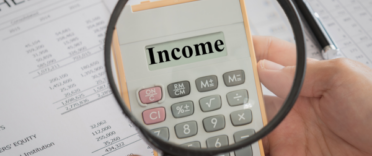
When you become self employed you become reliant on your ability to generate an income and will no longer be able to access your employer's sick pay benefits. If you become ill or have an accident and are unable to work then your income would cease or be severely reduced.
In this article, we describe how self employed income protection insurance, which is sometimes referred to as sick pay insurance, works and explain which benefits you may be entitled to and alternative insurance options that could give you the security you need. We also explain how to source the right type of income protection for your specific needs where you will receive up to £100 cashback* when you buy.
1 minute summary - Best self employed income protection insurance
- Income protection insurance can replace your income if you become unable to work due to illness or injury
- You can cover up to 70% of your gross earnings
- You can choose to prove your earnings upfront or at the point of a claim
- Some insurers will provide a guaranteed income benefit that is protected against fluctuations in your income
- Other types of insurance such as critical illness insurance, life insurance and private medical insurance can provide security for self-employed people
- Insurers vary in the way your occupation and health are assessed so it helps to get expert guidance
- Speak to an income protection insurance expert* and get up to £100 cashback
What does self employed income protection cover?
Self employed income protection cover provides a long term monthly income if you are unable to work due to illness or an accident. The amount of monthly income provided is selected at the outset and will provide an income of between 50% and 70% of your income when you were working. The exact level varies between insurance companies.
Your income protection insurance is based on the income you receive personally which you may take as a salary if you are set up as an employee of your company or as profits if you are a sole trader or contractor. It is a way of ensuring that you can meet your personal financial commitments if your earnings stop. Often people who choose to be self employed give up the security of a salary and sick pay from their employer – income protection insurance can reinstate some of that security.
In a situation where your incapacity to work would affect the revenue that your business generates and you wish to protect the business and not only the income that you take from your business, you should consider keyperson insurance. Keyperson insurance is a business insurance that will pay the business if you can't work and can be arranged alongside your self employed income protection insurance. This would mean that both you and your business receive a benefit in the event that you are unable to work which could cover the cost of replacing you in the business while you recover. You can read more about this type of insurance in our article, “What is keyman insurance?“.
Why should the self employed or contractors consider income protection insurance?
If the business that you or your business generates depends on your physical and mental ability to work, both you and your business could suffer a loss of revenue if you were to become ill or injured. Any reduction in income would not only affect your family's financial situation but also that of your business if you are unable to pay the monthly bills that still need settling.
It is therefore advisable for all self employed people to obtain income protection insurance (also known as self employed sick pay insurance or income replacement insurance). An income protection policy for the self employed will provide a regular income if you are unable to work due to sickness or as a result of an accident.
Income protection insurance for the self employed is one the most important insurance policies to consider if you are self employed or considering becoming self employed. Without a self employed income protection plan you will have to fall back on your savings if you have these or claim Employment and Support Allowance to help pay your bills.
How much will government Employment and Support Allowance pay you if you are self-employed?
Employment Support Allowance is initially paid for up to 13 weeks after your claim. The initial payment is £71.70 a week if you are under 25 or £90.50 a week if you are over 25. These payments could rise to £138.20 a week after 13 weeks depending on your personal circumstances.
In contrast, self employed income protection cover would provide you with between 50% and 70% of your gross income, tax-free although this varies between insurers.
How to work out if you really need self employed income protection?
If you are self employed, have dependents and do not have a significant amount of money in the bank then it is more than likely that you will need self employed income protection.
If you are unable to work due to illness or an accident then you would likely still require an income to pay your mortgage and other household bills. In addition there may be bills from your business such as staff wages, rent and utilities that will require settling every month which would put a greater financial burden on you and your family.
How does self employed income protection insurance work?
Self employed income protection insurance covers your income and your monthly premium insures you so that you receive a replacement income benefit if your income stops due to incapacity. Here are some of the key features of this type of policy.
| Self employed income protection insurance feature | How it works |
| Sum insured | this is the amount of monthly income you will receive if you claim and can be up to 70% of your gross income which can be derived from your pre-tax profits |
| Policy term | this is how long you will be insured for and is usually the period of time until you retire |
| Payment period | this is how long you can receive a monthly income if you claim and you can choose between 1, 2 or 5 years or you can simply choose full cover and you will receive your income until you recover and return to work or you reach retirement age (the limited periods of cover can be cheaper) |
| Indexation | you can link your monthly income benefit to be indexed with inflation so that it keeps increasing year on year |
| Linked claims | you can usually make multiple claims and the insurer can link claims if you become incapacitated for the same reason after returning to work |
How much does self employed income protection cost?
How much an income protection policy costs will depend on your circumstances, your health and the policy benefits chosen.
You can choose the duration of cover that you want. There are full term and short term options. The short term options are sometimes referred to as budget options.
Short term income protection
The benefit will start paying after an initial waiting period that you choose and will continue for up to a maximum of 1, 2 or 5 years for each claim that you make. You can make multiple claims as long as you return to work for a minimum time period specified in your policy terms which is usually 6 months to a year.
Full term income protection
The benefit will start paying after an initial waiting period that you choose and will continue for as long as it takes for you to be fit to return to work or until you reach retirement age.
Cost of short term income protection – will pay for a maximum of 1 year per claim
| Cover Type: | Age | Deferred period (waiting time from 1st day of illness to payment) | Monthly Benefit | Cover until age: | Monthly premium |
| Short term – 1 year | 30 | 4 weeks | £1,500 | 65 | £11.23 |
| Short term – 1 year | 40 | 4 weeks | £1,500 | 65 | £17.53 |
| Short term – 1 year | 50 | 4 weeks | £1,500 | 65 | £27.97 |
all premiums are correct as of 4th July 2024 and are based on a healthy person who does not partake in any dangerous sports or activities
Cost of full term income protection – will pay for full duration of incapacity up to retirement
| Cover Type: | Age | Deferred period (waiting time from 1st day of illness to payment) | Monthly Benefit | Cover until age: | Monthly premium |
| Full term | 30 | 4 weeks | £1,500 | 65 | £35.79 |
| Full term | 40 | 4 weeks | £1,500 | 65 | £56.21 |
| Full term | 50 | 4 weeks | £1,500 | 65 | £86.63 |
all premiums are correct as of 4th July 2024 and are based on a healthy person who does not partake in any dangerous sports or activities
The following factors may be taken into account when calculating the premiums:
- Age
- Occupation
- Current state of health and whether you smoke
- Level of income provided
- Deferred period
- Length of benefit term
- Benefits chosen
Additional benefits that can be included with income protection cover
- Waiver of premiums – this is where the payment of premiums is waived whilst the insured person is off work.
- Rehabilitation – some insurers will provide help with rehabilitation to get you back to work sooner or pay part of your monthly income if you can only return to work part-time.
- Critical illness cover – some insurers will allow a lump sum payment equal to the monthly amount payable typically over 12 months on the diagnosis of a critical or terminal illness.
- Death cover – some insurers will allow life cover to be added to a plan that can include your income protection insurance.
What are the alternatives to self employed income protection insurance?
Whilst self employed income protection insurance is important there are other insurance policies that you should consider in order to create some financial security for yourself and any dependents you have. These can also be arranged alongside a self employed income protection policy to give you comprehensive financial security against unexpected health concerns.
Life insurance
Life insurance is the cornerstone of your family's protection arrangements. If you were to die then your family would not be able to continue with their current lifestyle as your income would die with you.
Critical illness cover
Critical illness cover is a long-term insurance policy that will provide a tax free lump sum if you were diagnosed with a critical illness such as cancer or in the event you had a heart attack or stroke. This type of policy is designed to pay off debts such as a mortgage or provide for alterations to your home or health care costs due to your illness. The important point is that critical illness insurance pays out upon diagnosis, even if you go on to make a full recovery.
Private medical insurance
This policy will provide cover for private medical treatment in addition to that provided by the NHS. Many self employed people find this type of policy useful as any treatment required can be carried out quickly rather than you joining the NHS waiting list, which could slow down your return to work.
Keyman insurance
Keyman insurance is a life insurance policy taken out on a key employee within the business and designed to protect the business financially if a key employee dies suddenly. As many self employed people are in partnership with others it is a worthwhile policy to have as part of your protection cover.
Different types of income protection insurance
What we describe in this article is long term income protection insurance which will provide you with an income for the period of time that you are incapacitated. This could be a few weeks or months but it could also be numerous years and the policy would continue to pay your income to you as long as you meet the incapacity definitions. There are less comprehensive versions of self employed income protection insurance that provide a short term solution but often come with some exclusions and we describe these below.
Accident and sickness insurance
This type of policy will pay a monthly income if you are unable to work due to illness or an accident. This type of policy is available for the self employed and is often referred to as self employed sickness cover or self employed sick pay cover. It is usually only a short term solution and usually only pays for up to 12 months.
This type of income protection insurance may not ask you about your health and instead, it may exclude all pre-existing medical conditions for you.
Unemployment insurance
This type of policy will pay a short-term monthly income if you become unemployed or redundant through no fault of your own. This is obviously not available to the self-employed.
Accident, sickness and unemployment insurance
This type of policy will pay a monthly income if you become unemployed or redundant or are unable to work due to illness or an accident.
What does self employed income protection insurance not cover or exclude?
- The deferred period – when you buy your policy, you will choose a waiting period which is called the deferred period and this is how long you are happy to wait from your first day of incapacity until you receive your benefit. The period can be as little as 1 day or as long as 12 months and you should base your choice on the amount of time you can manage your finances without help from the policy. The shorter your waiting time, the more expensive your policy will be so it is worthwhile getting different quotes to work out the optimum waiting time based on cost for your budget.
- Pre-existing conditions – you will usually complete a health questionnaire when you apply for income protection insurance. In some cases, the insurer may exclude a medical condition based on your health history but this will be outlined in your policy terms before you choose to start your cover so that you are aware of the limitations of your insurance.
- Incapacity that doesn't meet your insurance definitions – your illness or injury will only be covered if it prevents you from being able to work and you will need to provide evidence to support this.
- Prospective revenue – you will be covered on the basis of your earnings and won't be able to claim for any increased revenue that you missed out on due to your incapacity. The insurance will only look at what you have materially earned before you became ill or injured.
What’s the difference between unemployment insurance and income protection insurance?
Unemployment insurance is a short-term insurance policy that will provide an income for a period (typically 12 months) if you become unemployed or you are made redundant through no fault of your own. Unemployment insurance is generally not suitable for those who are self-employed as they are unlikely to qualify for a claim. Income protection insurance is a long-term insurance policy that will provide an income if you are unable to work due to illness or an accident. Self-employed individuals and contractors usually need income protection to secure their income in case they become unable to work.
How to find the cheapest and best self employed income protection policy
The best way find the cheapest and best self employed income protection policy is to speak to an independent income protection specialist*.
We have teamed up with LifeSearch*, one of the leading UK providers of self employed income protection insurance. LifeSearch will compare the best self employed income protection quotes from a range of insurers in order to find the cheapest and best cover for your own personal circumstances. They will help to complete the application forms, chase the insurance company on your behalf and they have their own dedicated claims team, meaning they will help you out if you ever need to make a claim. Click the link above and complete the short form and they will be in touch right away for a no-obligation quote. Should you decide to take out a policy LifeSearch will also give you up to £100 cashback.
If a link has an * beside it this means that it is an affiliated link. If you go via the link, Money to the Masses may receive a small fee which helps keep Money to the Masses free to use. The following link can be used if you do not wish to help Money to the Masses and do not wish to qualify for the cashback referred to in the article – LifeSearch






